Adrian Tchaikovsky's Blog, page 15
January 23, 2014
The MMOs of yesteryear
TIme for something relatively trivial.
I like MMORPGs. They're the game genre I've spent most time playing for the last seven or eight years, with occasional excursions for Skyrim, Portal 2 and a few others. When I started off there was a small number of them (1) and I played just the one. Now there seem to be hundreds and I've tried quite a few. However the winds of change appear to be on the blow. MMOs are huge, expensive monsters to breed and to maintain, and in that period of time the entire gaming market has basically discovered that there's a buttload of money to be made doing exactly the opposite: Super Farm Crush, Angry Zombie Ninja, Cut the Head off Nigel the Kitten, whatever. And I think characterising these as opposites isn't unfair. MMOs are designed for intensive long term play, are most at home on a high performance desktop computer, stretching to laptops and more reluctantly to tablets and consoles. Casual games can be played on a phone, are cheap to make and can be picked up and put down as you like, and played while you wait for the lift to arrive.
I very much hope that MMOs go from strength to strength, but I think if that's going to be the case, they need new strengths. As it happens, there are some games which are at least testing the tensile strength of the envelope, though I've not seen it truly pushed as yet.
Baseline then. I need to make this clear: I have been a World of Warcraft player for a hella long time now, from a year after its release. WoW is an eminently playable game now, and it was a spectacular, ground breaking game when it came out. When there's one of those news articles jeering about how it's lost players, the number of players it's lost is often larger than the total player base of some of its rivals, and yet it still has millions of people rinding the daily quests. The reason so much of the below is going to be in comparison to WoW is simply that WoW dominated the industry for so long, and arguably still dominates it (see (1) below for caveat of course). Nothing else has even got into the throne room, let alone taken a shot at the crown. And one major problem is that pretty much every game so far has been "WoW plus one or two funky concepts", and the diminishing returns are built right into that kind of thinking.
Character focus
Traditional pen and paper RPGs are generally character focused. Single player computer RPGs can also be character focused. One of the great strengths of the Elder Scrolls series is that you are your own person, making your own choices, and the plots are for you, not just . Star Wars: The Old Republic went some way towards bringing character properly into the MMO scene with its personal class quests, although I found that these diluted quiet rapidly until your personal input was pretty much nil, and you were still being railroaded along a particular path. Elder Scrolls Online has suggested it will also have individual plot, though I suspect it will be the same kind of thing — the same individual plot for all characters of a particular demographic ("We are all individuals!").
So, idea: Skyrim's Radiant system was a beautiful thing. It would basically give you as many quests as you liked, randomly generated, although they did get samey after a while. While there's most definitely room for continuous random quests in an MMO to keep things fresh, especially for the all-important endgame, it shouldn't be difficult (2) to have a continuous personal plot generated randomly within set parameters. Let's say that, when you make Ogo the Dwarf Warrior, you get a set of choices from which you pick that a relative of yours has gone missing and you're trying to find them. As you go about your Warrior business sometimes an enemy drops a note or clue. That gives you unique quests to go to other places (places you'd be going to anyway most likely) to follow the trail. There are plot-relevant enemies and items and instances just for you. Eventually you rescue or avenge the family member, and select a new character motivation from the pull-down menus — you're after treasure, you're wanting revenge, you're looking for a lost civilization… Instantly the player has a personal stake in the world. You've made a difference.
Connected with this is the whole faction fail of many MMOs. Warcraft, and a great many of its imitators, have factions. You're either blue or red. Sometimes you're blue, red or green. The blues, the reds and the greens all hate each other and want to fight. If you're of race A, B and C, go to the red corner. if you're D… etc. There's a rationale for it in Warcraft that just about holds for most of the races. Other games have adopted the same political/racial apartheid for reasons that are phenomenally flimsy. In Rifts there are essentially two different schools of pholosophy… and every race is 100% devoted to one or the other, no exceptions. In Star Wars, all bounty hunters work for the Sith and all smugglers for the Republic. It's depressing to note that, other promising qualities aside, Elder Scrolls Online has absolutely bought into this, with the familiar races crammed rather randomly into three factions that are completely opposed — the utter antithesis of the single player choice Bethesda always gave you. I understand this makes it convenient for PvP, but frankly there are loads of games out there specifically geared only for PvP. Go Team Fortress, go League of Legends. Why should a player not have the option of choosing a side regardless of race, or even switching sides by their actions? Or taking no side at all?
Making a Difference
Another big MMO problem is that time and space are inextricably linked. To move to the next zone is to go forwards in time. To return whence you came is to reset the clock: the bad guys are back on their feet, the victories are unwritten. Everyone looks at you funny when you talk to them about all those things you did for them. Traditionally, MMOs have worlds that replace, revert and respawn, over and over, so that your life is truly writ in water(3).
Most MMOs are on multiple servers, given the volume of players at any one time. And each server has run the same story, has the same bad guys and the same history. The players are basically just drifting through, not even the catalysts of history, changed, but failing to change the world around them. The Lich King will die even if you don't kill him. The Lich King would die even if nobody killed him, because the next expansion's due and the Lich King is old news.
Everquest is an old name in MMOs, but one thing that their new voxel-based offering Everquest Next promises is a persistent world, with each server having its own history based on player action. Again, wait and see. This might be no more than a fancy version of those huge server-wide shopping list quests that other games have trotted out in order to "unlock" the next expansion or whatever. But if it's genuinely true that player actions have a permanent impact on the world then that's interesting. Also terrifying, because a great many players can be real sods.
Random Worlds
The stuff about random quests above also applies to worlds, though with a fairly strong caveat. There are games that have systems for randomly generated landscapes — Minecraft famously does it — and it does a lot of other things too, so that it isn't a WoW clone at all, but has spawned its own legion of imitators. For Minecraft-a-likes, a procedurally generated world is a must — see Cubeworld, for example, or Terraria. Everquest Next is also going for at least a partly randomised world, presumably different each server.
However there is a real problem with this content, as with most 'random' content. Computers aren't good at random, and after a while it all begins to look very much the same, whereas a hand-tailored world, though more work-intensive and simultaneously by definition smaller, is at least going to be fresh until the end.
Big Games, Small Servers
The traditional MMO looks to have a thriving online community of players all in the same world at once, competing with each other, cooperating with each other, teabagging each other or just blithely ignoring each other. This is the root cause of a lot of the evils. If you have a world with 300 demanding players each of which has to be told they're the hero, the range of quests on offer must perforce become very bland and generic to cater to everyone — and even then in WoW you basically end up doing all manner of conflicting things just because NPCs ask you to, and what else is there? There's never any reward for not doing them, and sometimes you can't progress at all (4).
Games like Minecraft change that: Minecraft isn't really designed for everyone to play on a central server owned by Notch. It's designed for smaller groups of players to pay for their own shared server. This instantly makes having a world that the players' actions can shape easier — because each time a player builds a castle, they're not going to be fighting for elbow room with 299 others. Given the downscaling that computer games seem to be going through, with the enormous popularity of browser games, these smaller and more personal setups are very attractive. Trion's in-development voxel MMO, Trove, is designed for a server of 40 people or less — that's basically a WoW raid group, in the old days. Smaller population servers will always be more amenable to being tailored to players' wishes, and to allow player-created content.
Subscription v Free to Play
This is another big shake up in the industry. WoW is one of the few games still charging a monthly fee. Most of the rest either start as, or convert to, a free to play model where the game makers get their money by charging for other stuff in microtransactions — exactly the model that browser games use. This is all very well, and it makes these games much easier to pick up and try out. However, having played a couple, the play experience can make you feel as though there's a pushy waiter at your shoulder every moment, trying to push a desert menu into your hands when you only came in for a pint. Usually if you want the same full game experience a subscription would give you, you'll end up paying about the same or more for it — and of course then there are constant temptations to ease your game experience — better mounts, better companions, better friends(5) — sometimes to the extent that a sufficient application of real world money and you can just win the game without having to go through all that hassle of playing it. Who's got time for that?
(1) This is going to be an anglocentric article. I'm aware there is a thriving MMO scene in many other countries, especially in Asia, but I don't have the knowledge to comment on what direction it's going.
(2) Caveat: I know damn all about programming.
(3) World of Warcraft meets John Keats. You read it here first.
(4) Play a Tauren in WoW. In the first village you get a set of quests. One is "Those horrible gnolls are killing are our animals, go murder them". The rest are all "Go kill a large number of these animals, taking one specific body part from each and leaving the rest to rot." Absolutely true.
(5) Not yet but soon.
Share this
January 14, 2014
Mad Science
Super Secret Project Zeta Go!
I am very glad to announce that Tor UK have picked up a brand new novel of mine, as they announce here.
This is in addition to Guns of the Dawn (1) and the new series that will start with The Tiger and the Wolf. As you'll note, the new book is a bit of a step for me, as it's leaving the familiar lands of fantasy fiction and stepping into the future.
Portia's Children (2) will be my first ever full length science fiction novel, now with Real Science ™. Or at least that's the idea. I guess we'll find out just how good the sci-fu of my sci-fi actually is when people get to read it. As per various mentions of Super Secret Project Zeta. this is something I've been working on a while, and entirely without any certainty of publication, because it was an idea that got its teeth into me and just wouldn't let go. The result was something that turned out to be quite personal to me, and I'm delighted (/surprised) that Tor like it and want to perpetrate it on a wider audience, rather than burying it and me in a bunker somewhere and denying all knowledge of our existence.
Beyond that, and the teaser synopsis in the Tor link above (3) I will for the moment keep schtumm on who Portia is, and what's the big deal about her children, and what, oh what will happen to poor suffering humanity. Being a megalomaniac writer with the fate of the species in my hands is fun. (4)
(1) Holding title still, Hopefully by the time it gets released in early 2015 we'll have actually thought of what to call it.
(2) This title I'm happy with. Let them try to shift me from it.
(3) Which may in fact be not only inaccurate, but an intentional campaign of misinformation as to what the book is actually about. No promises, guarantees or warranties 
(4) No it's not just Shadows of the Apt in space. It's not. Seriously it's not, not in any way. Maybe.
Share this
January 10, 2014
Shotgun Linkstorm, awardage and conventions for 2014
Shotgun Linkstorm is most definitely my new band name. Anyway, dragging myself from the hibernation pod for another year I discover it's 2014. It's way too early in January to expect anything coherent so:
Super Secret Project Zeta
I will most definitely have some news on this, probably even next week. It's very exciting. To me, anyway.
The Year of Awarding Things
So yes, it's self promotion season, when we writers creep hermit crab-like from our shells and crouch on the sand waving our claws in the air until we get eaten by a seagull (1).
I'm not necessarily expecting to make enormous ripples when I cast my stones into the pond, but it's nice to note that War Master's Gate is on the eligibility list for the BFS awards 2014. Also up is my short story "Family Business" that appeared in the Alchemy Press Book of Urban Mythic. Urban Mythic itself is in the anthologies list, as is Tales of Eve that I was also in. Eligibility to vote is extended to BFS members and attendees of Fantasycon 2012 and 2014(2).
There's the BSFA and Hugo awards as well, each of which has its own body of votables, and the above works would all be eligible for those, if anyone with a vote is just sitting there thinking "Damn, I really love Tchaikovsky's writing. On an unrelated note, I have this vote just going begging and can't think of anything to do with it." Other vote-worthy items inclide the Solaris 2 anthology from waaaay back towards the start of 2013 and my story 'Feast and Famine' contained therein, seeing as some reviewers were so kind as to give it a mention.
Alan Brooks' cover for War Master's Gate deserves some recognition as well. At last Stenwold Maker!
In fact, Solaris 2 has been shortlisted for the Philip K Dick award this year which, for all I'm just one oar in the galley, is still very flattering. Crossed fingers for that one.
If you do have a vote, but are still shopping around, you could do worse than check out Adam Christopher's post here or Paul Cornell's here (and seriously, London Falling is eligible for the Hugos owing to its US publication date, and it is a damn fine book), and Emma Newman's here. Emma's got three books of her Split Worlds series out in 2013 and I would be very surprised if she doesn't net at least one award for it. And I called last year's Clarke awards, so I am obviously an infallible oracle on these matters.
Diversity Linkage (4)
Social media has recently bunged me a number of interesting links on this topic, and I want to pass a few of them on as definitely worth a read. Firstly I can recommend both Chuck Wendig and Sam Sykes on the subject of the "masculinity" of fantasy (or otherwise).
Secondly, I came across a couple of articles on the subject of cultural appropriation by writers. This is something that cuts close to the bone for me: The Tiger and the Wolf is a fantasy that I am trying to take outside the customary Medieval/renaissance Europe model, and although I am creating my setting from whole cloth, this is inevitably going to include taking inspiration from other cultures. There is a tightrope, therefore: on the one side, the War of the White Guys, on the other, well, the War of the White Guys wearing funny clothes and using the occasional odd word to show they're foreign, I guess. The articles are: The Appropriateness of Appropriation by NK Jemisin, which refers to Nisi Shawl's article here. All good food for thought.
Convention Season in 2014
Yes, this is the year I cut down. The last two years have been con-heavy, and this year… I am doing three large cons within 4 weeks, FFS. Anyway, I plan to be at:
Nine Worlds, Heathrow, 8–10 August
Loncon 3 (Worldcon), London Excel Centre, 14–18 August
Fantasycon, 5–7 September, York
Bristolcon 25 October, er, Bristol, I assume.
(1) A simile that rather got away from me.
(2) Anyone who went to Fantasycon 2013 can suck it.(3)
(3) and was presumably rather lonely as there wasn't one.
(4) Diversity Linkage would most definitely be a Pratchettean witch if I ever got to do a Discworld homage story.
Share this
December 22, 2013
Pillars of Salt
Or, time for a brief glance backwards. It's been a mixedsort of year. A lot of people I know have had a rough time of it for various reasons — illness, personal problems and the vicissitudes of the writing game amongst them. The industry has lost a lot of people. It has been something of a subdued year all told.
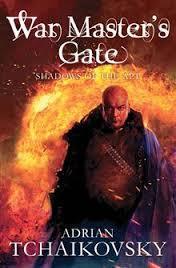 On the plus side, War Master's Gate is out, and next year will see the grand old series finally reaching its denouement (July release for Seal of the Worm they tell me), and that means 2013 has been the first year since 2006 that I've spent mostly working on non-Shadows of the Apt stuff. Guns of the Dawn (1) has been polished up and delivered. The Tiger and the Wolf has had its first draft completed. I should also have some news I can trumpet about super-secret project zeta, or whatever I was calling it a while back, but that's for the new year.
On the plus side, War Master's Gate is out, and next year will see the grand old series finally reaching its denouement (July release for Seal of the Worm they tell me), and that means 2013 has been the first year since 2006 that I've spent mostly working on non-Shadows of the Apt stuff. Guns of the Dawn (1) has been polished up and delivered. The Tiger and the Wolf has had its first draft completed. I should also have some news I can trumpet about super-secret project zeta, or whatever I was calling it a while back, but that's for the new year.
I've updated my bibliography here from which you'll see it's been a decent year for short stories as well. I've had my first ever reprint (in the Vandermeers' Time Travellers' Almanac) and my first ever collection out in Newcon's Feast and Famine.
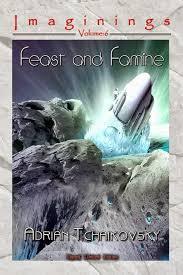 I've joined Twitter, which turned out not to be the sign of the End Times I'd always assumed it was (@aptshadow, if you didn't catch it). I have also expanded my circle of writing friends considerably, adding such luminaries as Emma Newman and Gareth Powell. I've had a good convention year — in fact despite vowing to cut down, I've feel like I've been to more than ever before. I count Eastercon, Edge Lit, Nine Worlds, Andromeda and World Fantasy. Nine Worlds I enjoyed particularly, and I've already booked for that, Loncon 3 and the York Fantasycon. It would be nice to make Bristolcon next year too, as I hear so much good stuff about it.
I've joined Twitter, which turned out not to be the sign of the End Times I'd always assumed it was (@aptshadow, if you didn't catch it). I have also expanded my circle of writing friends considerably, adding such luminaries as Emma Newman and Gareth Powell. I've had a good convention year — in fact despite vowing to cut down, I've feel like I've been to more than ever before. I count Eastercon, Edge Lit, Nine Worlds, Andromeda and World Fantasy. Nine Worlds I enjoyed particularly, and I've already booked for that, Loncon 3 and the York Fantasycon. It would be nice to make Bristolcon next year too, as I hear so much good stuff about it.
I've got involved with a new Larp system (Empire), which I'm looking forward to resuming next year. I've played almost no new computer games, which is a shame. As for books, films etc, see the previous post. I've also started to try and broaden my repertoire by making some moves towards becoming a comics writer. No progress yet but I'm pursuing some possibilities right now. We'll see how that pans out.
Next year: the climax of Shadows of the Apt; the year after, my first long-form fiction to be published in any other setting. It's enough to make anyone twitch, frankly.
All the best for the new year.
Adrian.
(1) or whatever we will call it, still reaching for the right title on that one.
Share this
December 18, 2013
You Might Also Like…
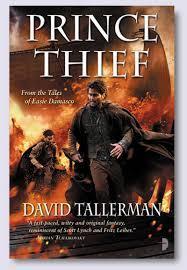 I did get through a metric crapton(1) of books this year, and a lot of them were very good. I'm not going to do a 'best of', but I want to flag up a few reads that people might not have come across, and that I think deserve some attention. If you're looking for a good, solidly written book with a different perspective, you could do a lot worse. Also late Christmas presents (2).
I did get through a metric crapton(1) of books this year, and a lot of them were very good. I'm not going to do a 'best of', but I want to flag up a few reads that people might not have come across, and that I think deserve some attention. If you're looking for a good, solidly written book with a different perspective, you could do a lot worse. Also late Christmas presents (2).
David Tallerman has brought what could be a final volume to the trilogy that started with Giant Thief this year. David's writing goes from strength to strength. I especially enjoyed Crown Thief, the second volume, and Prince Thief does a good job of bringing the overarching storyline home. There's quite an art to writing the story of a character trying to escape the plot at every turn and David certainly has it.
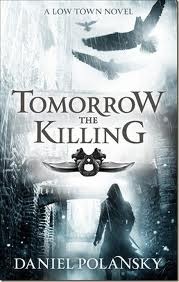 Also in secondary world fantasy, Daniel Polansky's sequel to The Straight Razor Cure is Tomorrow the Killing and it is frankly the grimmest and darkest of the grimdarks, vicious, brutal, pulling no punches and yet extremely compelling reading. For a first chapter of a new story, you could do a lot worse than look out Jen Williams' The Copper Promise, which I was lucky enough to score an advance reader copy of. This is a more traditional heroic fantasy, but with a lot of twists and some seriously conflicted lead characters. I can see it ranking highly in the Morningstar Award for new writers in the Gemmells.
Also in secondary world fantasy, Daniel Polansky's sequel to The Straight Razor Cure is Tomorrow the Killing and it is frankly the grimmest and darkest of the grimdarks, vicious, brutal, pulling no punches and yet extremely compelling reading. For a first chapter of a new story, you could do a lot worse than look out Jen Williams' The Copper Promise, which I was lucky enough to score an advance reader copy of. This is a more traditional heroic fantasy, but with a lot of twists and some seriously conflicted lead characters. I can see it ranking highly in the Morningstar Award for new writers in the Gemmells.
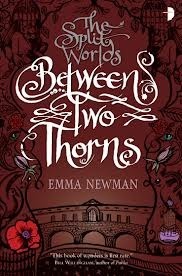 I've read some good urban fantasies this year as well. Tom Pollock's The City's Son takes the genre somewhere west of Vandermeer and Mieville in sheer wierdness, while Emma Newman's Split Worlds series, starting with Between Two Thorns, is a beautifully written account of a clash between our world, the hostile realm of faerie, and a weird middle ground where it's always 1800 and never Christmas. The entire series has come out on its own heels, and Emma's fluent, elegant writing style make them swift and engaging reading.
I've read some good urban fantasies this year as well. Tom Pollock's The City's Son takes the genre somewhere west of Vandermeer and Mieville in sheer wierdness, while Emma Newman's Split Worlds series, starting with Between Two Thorns, is a beautifully written account of a clash between our world, the hostile realm of faerie, and a weird middle ground where it's always 1800 and never Christmas. The entire series has come out on its own heels, and Emma's fluent, elegant writing style make them swift and engaging reading.
Superhero novels are a thing, now, in that there's more than just the odd one or two. Samit Basu's Turbulence is one of the best I've read, intelligent, action-packed, well characterised and with the added interest of setting the story in India: the book has a very fresh feel and avoids the clichés.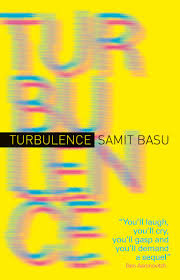
The Fictional Man is a novel by comics creator Al Ewing, and is fairly heavily metaphysical. The setting is a world where actors are being replaced by vat-grown engineered 'Fictionals', which becomes the backdrop to explore a whole lot of the human nature — identity, prejudice, the lies we tell to ourselves. It's very funny in places, very sad in others, and it gets quite heavy at times, but it's very good.
Last we have the SF, and this year most of my SF diet came in small bites. Ian Sales' first two Apollo Quartet instalments are weird and strange and crammed with verisimilitude (I've not read the third yet), and seem to chime perfectly with the burgeoning fascination with the space race, old and new, that seems to be springing up everywhere like extrasolar mushrooms. I read a lot of shorts collections this year, too (and I really want to plug some I'm in, but that would be somewhat unethical. And anyway, already did that.) but I think the two I enjoyed the most were veteran 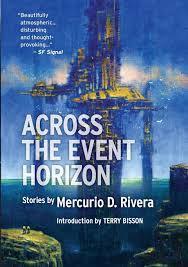 author Paul McAuley's A Very British History from PS Publishing, and Mercurio Riviera's Across the Event Horizon. I hadn't ever come across Riviera until Eastercon this year, but his writing is superb, imaginative and very thought-provoking.
author Paul McAuley's A Very British History from PS Publishing, and Mercurio Riviera's Across the Event Horizon. I hadn't ever come across Riviera until Eastercon this year, but his writing is superb, imaginative and very thought-provoking.
I also saw a relatively small number of films over a year which seemed to have more than its share of turkeys. There were an awful lot of films coming out that I was extremely glad not to be shelling out nine quid for at the local Vue, frankly, and I'm not sure how many Lone Rangers the world can survive before the Four Horsemen of the Apocalypse feel they need to stage some sort of intervention. In no particular order, though, I did enjoy Iron Man 3, Thor 2 and the second Hunger Games film, all of them good, enjoyable viewing experiences. Gravity was very good, although it was one of those films that really didn't have much beyond those tense, beautifully crafted moments on-screen — not a film I felt posed questions or set the mind working. I think the film that touched me most in 2013 — and here I am going to do a personal 'best of' — was another rigorous SF offering, The Europa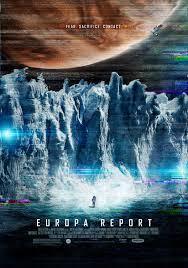 Report — perhaps not as technically perfect as Gravity, but dealing with a story I find inherently more interesting. I find myself thinking far more on the decisions — especially the fateful final decision — made by the members of the Europa expedition than I do about the tribulations of Bullock and Clooney's desperate astronauts — the Gravity story is exactingly concluded at the end of the film; Europa Report's is only starting.
Report — perhaps not as technically perfect as Gravity, but dealing with a story I find inherently more interesting. I find myself thinking far more on the decisions — especially the fateful final decision — made by the members of the Europa expedition than I do about the tribulations of Bullock and Clooney's desperate astronauts — the Gravity story is exactingly concluded at the end of the film; Europa Report's is only starting.
(1) I was aiming for the Imperial crapton, but stuff got in the way.
(2) Only if the recipient already has all of mine, though, obviously.
Share this
December 13, 2013
Transporter Beam Forwards, Apparate Back
"Everyone in fantasy books is always resorting to the "old magic". Why isn't the new magic better? That's what I want to know," said Obi-Jon (@jonthepo0le) on Twitter, possibly not expecting to get taken up seriously on it. My knee-jerk answer was "because then it would be science-fiction." (1)
Wouldn't it?
Okay, let me expand briefly — and I honestly hadn't thought of it like this before — but is there any system where the magic of now is an improvement of the magic of yesteryear? I would be really interested in any other examples people have. Or where magic is something that people are actively experimenting with, investigating and refining? Actually, there are a few. Juliet E McKenna's Hadrumal Crisis (and its precursor seriesses) shows wizards who are approaching magic with an analytical eye, and attempting to produce new effects through known magical properties. In Sanderson's Mistborn series the very regimented and understood magic is developed by the protagonists — ah, but there it's still a shadow of an earlier age of gods and monsters from which everything in the plot derives, and whilst Rothfuss's Kvothe is an innovator, his shadowy nemeses are proof that his magic is peanuts compared to the old days of power.
And of course the Inapt magic in Shadows of the Apt is the same — it used to be a big deal, and it's basically just dregs at the time of the book (and in fact you discover one reason why in Seal of the Worm, spoilers spoilers spoilers), whereas the technology of the Apt has been improving in leaps and bounds, artificers reacting to the work of other artificers so that the capabilities of the Wasps or Collegium as seen in War Master's Gate vastly outstrip anything that anyone has ever been able to accomplish before. There was no lost age of power that they are trying to rediscover, as is often the case with a magician protagonist. They are making it anew.
And there are SF books where the tech is being rediscovered — post-apocalypse and after-the-fall settings, and of course there are the SF-trappinged fantasies like Star Wars where there was an elder age, now fallen into disrepair (2). But the majority of SF looks forwards to at least the possibility of a superior future, just as we do in modern life. But there was a time when we didn't. Even though there were people actively innovating and making things better all the way through the history of the world, there has also been a very strong meme of any given current age being the least, a shadow of its predecessors. Just as Tolkien's Middle Earth slowly slides towards mundanity through a sequence of gods and elf lords and the like all taking up boating and naffing off until there's nobody left but, well, us, so historically, people have looked back on a lost golden age of heroes, or an antediluvian age before God god mad at us — an age when people were bigger and stronger and lived longer and… oh, everything. It's a mindset that is strongly implicit in many religions, that the arrow of progress basically only goes backwards — then was better, now is worse. That's why some people can use the phrase "the mother of all battles" unironically, when reason suggest that such a scrap would basically be two amoebas bitch-slapping each other.
What you need to be frightened of, given the world of reason, progress and improvement, is the child of all battles.
(1) Actually it was "because then it would be science fiction. Discuss" because I'm pretentious like that.
(2) And an artifact of the order the movies were made in adds to this impression — the prequels are far more high tech than the originals.
Share this
November 24, 2013
In Defence of Malekith
Well last post was Weighty and Meaningful, and today's is decidedly short on any kind of serious import. It also contains mild spoilers for Thor: The Dark World, though nothing that isn't covered in the prologue section.
So, Malekith. I've read a number of reviews so far about Thor 2. I really enjoyed the film — and the final action sequence manages to be both nail-bitingly tense and utterly hilarious, without either aspect sabotaging the other. One thing that turns up in a number of reviews, for example Bob Chipman's here, is that the principal villain, Malekith, is just a bit of demon-kingery, intending to destroy the universe for no real reason other than to make the plot work — all bombast and no real sense. I'm not entirely sure why, but I feel the driving need to fight in the poor chap's corner. Malekith makes perfect sense, and his motives and actions are entirely humanly plausible, given the means at his disposal.
Basically, the backstory runs like this: in the beginning there was a universe of darkness and it was ruled over by the dark elves, Malekith's people. Then all this light and matter and crap started getting out of hand, and made stars and planets and the nine realms, and the dark elves decided they weren't having any of that. They got hold of a weapon that could, if used very precisely, destroy everything and return the universe to the dark state they remembered so fondly. There was a big war and they got a kicking. However, the weapon survived, and so did Malekith and a few of his lads, and now it's that festive time again and the dark elves have a very long naughty list.
I did rather like Malekith as a villain. Christopher Eccleston (under a ton of makeup) did a good job at giving him dignity and gravitas whilst not at any point detracting from the complete batsh*t insanity of the character. The critics I've come across are mostly, "Well, it's Loki's film", and, hey, well, Tom Hiddleston, right? However fter the general "bah!" reaction to Malekith, I got to thinking.
The thing that makes it all look like motiveless mad villainy is the weapon, the Ether. That gives Malekith's scheme its all-encompassing crazy scale. If he didn't have it, then probably he would be in a room somewhere under a blanket, lord of a dark domain the size of his bed. With the Ether, he can put the blanket over the universe and revert things back to the good old days. And that's the thing. Because there are a lot of human beings, often very highly-placed and powerful, who pine for the good old days — frequently good old days that never existed. If you went to someone whose star was on the wane, whose way of life is under threat because people who were once either absent, or at least decently under control, and gave him a device that would rid the world of everything that did not belong to that supposed golden age — consequence free — then I reckon they'd do it. Go to a modern Klansman and say, "push this button and turn the clock back to before the civil war", say. Go to a right wing politician of any nation and tell them they could undo all the changes that have happened since their nation's "glory days", whenever they were. They'd do it. No matter the cost in lives and lost progress, I reckon there are plenty of people who are playing nice right now, because they don't have the means to achieve their impossible ends. Give them that magic wand, and they'd wave it until it broke in half. Malekith is not a demon king, he's a human given the chance to achieve every grumbling conservative's dream, a return to Good Old Values. The only difference is that in his case it's a literal darkness.
OK, didn't come out quite as light as I was thinking. Next week — kittens!(1)
(1) No kittens. Seriously, nobody sane would trust me with kittens.
Share this
October 30, 2013
Genre and Gender
Does SFF have a problem with women? Do women have a problem with it? A remarkable number of incidents over the last year or so have certainly put the issue in the foreground. It’s hard to avoid the feel of a storm getting ready to break. Here are some of the flashpoints. For the record, my personal opinion in each case is "yes, there is a problem", but rather than tub-thumping, I've gone mad on links for those that want to read further.
(Although gender is currently the most high-profile clash within the genre, most of these flashpoints have analogues for other types of discrimination, and many are just as relevant outside genre and outside literature as a whole.)
Harassment and abuse of prominent women in the genre
Easy one first. The reaction to Anita Sarkeesian for tackling the representation of female characters within computer games in Tropes v Women is probably the best example. This is a campaign of aggressive and persistent abuse, not even in response to the series itself but simply the suggestion that a woman might produce one. There was also the recent situation with Jennifer Hepler, one of the Dragon Age developers – it’s been stated that her leaving was not as a result of the harassment, but the fact of the attacks doesn’t seem to be in doubt.
Harassment at conventions and similar
Again, this should be an easy one, except that people have varying definitions of what constitutes ‘harassment’ – and sometimes those definitions may vary depending on the status of the harasser. Here’s John Scalzi on the subject. Anti-harassment policies are now common at conventions.
Attitudes to rape
To some rape is just a thing to throw in to emphasise how bad the bad guy is. Or here’s Bob Chipman’s take on a piece of business at PAX that flared up again recently (or Wired.com on the same subject) The most elegant argument for why it is a topic to tread carefully around is this article by Sophia McDougall. This isn't a "don't mention the R word" moratorium, but it is something to bear in mind.
Representation of women in the medium
The chain mail bikini, and use of women characters as little more than motivators and rewards for the male protagonist. This is one of the oldest openly-voiced criticisms of SFF, and it’s certainly an easy target for people looking to sneer at the genre. Sarkeesian has a good take on the damsel in distress in Tropes v Women and here is Sophia McDougall in the New Statesman on strong female characters and the problem with that. The latter article is well worth a read from a writer's POV (and similar sentiments from KT Davies here).
Fake geek girls
Women attending conventions – especially cosplayers– have met the accusation that they’re “not real geeks”, that they’re there for some nefarious purpose other than a genuine interest in the genre. Bob Chipman, again, has a good brief take on it at the start of this video. That some fans may feel that their “club” is no longer exclusive is unfortunate; that industry spokesmen feel their corner of the genre is "not for girls" is more so. On a purely commercial basis it seems mad to try and exclude 50% of your potential paying customers.
Reaction to all-female Fandom
This was a new one to me, one I hadn’t considered until I saw this. Do female-dominated fandoms meet a different kind of disdain to male dominated fandoms? A twofold issue of “they like something we don’t” and “they like something in a way we don’t”, and worse, of course, if that thing is in the spotlight and hence cannot readily be ignored. I think there are male fandoms that do have this problem – “Bronies” spring to mind — so it’s not quite so clear cut.
Diversity within fiction
This has the danger to become a hobby horse for me, so to be brief: there’s remarkably little diversity in fantasy and SF settings, whether they’re 2ndary world, historically-inspired or actually historical – less diversity than in actual history, quite often. A predominantly white male body of authors tends to write, without any malice aforethought, about the exploits of male heroes in white cultures. That’s just the default go-to. My world-building point is really just that writers can consider whether their world must necessarily default to that. The real world is diverse, and our created worlds can be more so or less so or however we choose. Martin gives us a world in Westeros that is dominated by warrior men, but he gives us characters like Cersei and Brienne to draw attention to the strictures of that social setup (see Mary Sue for some remarkable historical women), and the books are that much richer for it. Erikson’s Malazan books have plenty of female soldiers and wizards and the like at all levels, and here’s Scott Lynch responding to an objection to his female pirate captain in Red Seas under Red Skies.
Perception and representation of female authors
“Panel parity” is a convention idea that has run through various iterations, but in general it represents making a positive effort to include more women (and other underrepresented groups) on panels and other events at cons. This is positive discrimination, which gets up a lot of noses. Some conventions do it, others don’t. The standard counter-argument is that the con organizers want “the best people for the panel”, and that point of view certainly has a lot of support.
My very personal POV is that “choosing the best” is a worthy aspiration, but that human frailty can easily preclude the necessary objectivity such an ideal would require. I don’t see active malice or discrimination in this, but our starting position, when we cast our eyes over the field to choose who is “best”, is informed by decades of tradition going back to much more unequal times. The parity argument is that active redressing is needed to compensate for this hidden bias.
Of course, in many areas of the genre there is a decided weighting of male authors. This post from Tor UK’s Julie Crisp gives submission figures and an editor’s take on them.
One issue that has been flagged up recently is not a dearth of women writers, but the reception met by the large body of them we already have. This was most recently highlighted by a dispute arising within the SFWA and there’s plenty of commentary on both sides all over the net. I guess this category also covers divisions into “authors” and “women authors”, which will always come over as a trivialisation of whoever you’re excluding from the main list of “authors”. In this recent overview of fantasy writing women get very short shrift (le Guin, anyone?) And this isn’t just a genre problem , but then a lot of these issues are not just genre problems. Finally, because this has been heavy going, I leave you with some satire from Jim Hines on the topic.
Share this
October 16, 2013
World Fantasy Convention — Where I am at.
31st October to (counts on fingers) 3rd November is when mild-mannered bespectacled Fantasycon tears off its shirt and reveals the bare nipples of World Fantasy Convention 2013, and if we're thinking bare nipples in the UK, we must of course be talking of Brighton. I am at this, as a very minor footnote to a very large ensemble cast, and shall be skulking about in the background and taking up space in the bar while magnificent grandees of the world fantasy scene parade past in elaborate gold-filigree'd hats (1). Always the bridesmaid…
Anyway, enough of such maudlin nonsense. This is what I've signed up for.
Firstly, attendees get, I think, a free anthology of fantasy fiction under the title of Unexpected Journeys (2) put together by the able Juliet Mckenna, which includes one from me entitled The Groppler's Harvest. What, you ask, is a Groppler? Perhaps, Adrian, you mean the Star Trek bit part from Encounter at Farpoint. No, I reply, I do not, but perhaps I should have googled the term to discover whether it was already a genre thing. Anyway. my Groppler is very different. It has a harvest and everything. Although lacking in the giant space jellyfish department.
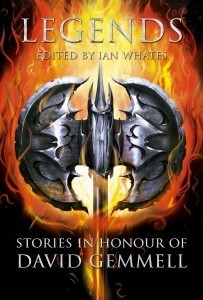 8pm Thursday 31st Oct Gemmel awards and Legends launch — I can honestly say, of the Legends anthology, that it is a damn good "state of the nation" heroic fantasy anthology. Some very fine names have turned out to honour the name of David Gemmel, and this is the sort of fantasy anthology that I remember devouring as a fantasy reader way back, but that you don't seem to get so often these days. Such fantasy luminaries as Joe Abercrombie, James Barclay, Juliet McKenna and Anne & Stan Nicholls are in it, along with one from Ian Whates, the editor. We're launching it alongside the Gemmel Awards, for which I will be redoubling my skulking and lurking. My Legends story is a Shadows of the Apt piece called "Sword and Circle" about the mystic society of warriors that Tisamon belongs to,
8pm Thursday 31st Oct Gemmel awards and Legends launch — I can honestly say, of the Legends anthology, that it is a damn good "state of the nation" heroic fantasy anthology. Some very fine names have turned out to honour the name of David Gemmel, and this is the sort of fantasy anthology that I remember devouring as a fantasy reader way back, but that you don't seem to get so often these days. Such fantasy luminaries as Joe Abercrombie, James Barclay, Juliet McKenna and Anne & Stan Nicholls are in it, along with one from Ian Whates, the editor. We're launching it alongside the Gemmel Awards, for which I will be redoubling my skulking and lurking. My Legends story is a Shadows of the Apt piece called "Sword and Circle" about the mystic society of warriors that Tisamon belongs to,
12pm Friday 1st November Alchemy Press book launch — The good folks at Alchemy have three anthologies being released, I think, but my concern is with their Urban Mythic volume, which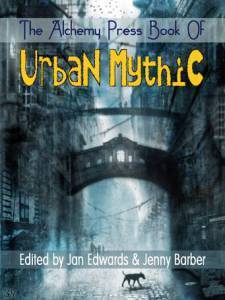 I'm in. My story here is Family Business, a pleasant little story of fallen gods, murder and London. Also being touted by Alchemy are Astrologica: Stories of the Zodiac, and The Alchemy Book of Pulp Heroes 2.
I'm in. My story here is Family Business, a pleasant little story of fallen gods, murder and London. Also being touted by Alchemy are Astrologica: Stories of the Zodiac, and The Alchemy Book of Pulp Heroes 2.
8-10pm Friday — Mass Signing — or maybe not. Who can say. The alarming blurb I've been sent for this one states "Only Guests of Honour and those writers we expect long lines for will have pre-reserved places… Others wishing to participate will need to find an empty chair and sit down." So… that does seem to generate an alarming amount of whatthef*ckery on an initial reading. I guess the, er… the big names will have places at the top table and the rest of us will… fight for elbow room? Sit like a gang of beggars at a bazaar and hold out beseeching pens to the heedless crowd? Or maybe they'll play music, and when it stops the non-bestselling authors will have to frantically scramble for a seat. I'm probably not getting it, but, er… not entirely sure about how this is meant to work. Should I bring my sword? Is signing space strictly on a Dead Man's Dust-jacket basis? Can I take Joe Abercrombie on, mano-a-mano? Probably not: he's very light on his feet. So not sure if I will actually be mass signing anything, but it's on, anyway. If you're queuing for the GoH and someone tugs at your cuff and waves a second-hand copy of The Sea Watch pleadingly at you, that'll be me.
10am Saturday 2nd Best of all Possible Worlds panel. God save me, why do I always get the first-thing-in-the-morning jobs? I'm not complaining. Panels have been rationed. I'm glad to have it. I will be staggering in for this and discussing world-building, because it's probably the only subject I can talk about intelligently after a heavy night such as I'm very much intending to have on the Friday. I know I have Hal Duncan as a comrade in adversity, but no idea who else. If you don't know Mr Duncan, by the way, his Vellum and Ink are some of the most ground-breaking and ambitious weird fiction I've ever come across.
5pm SaturdayReading Slot Yes! I will be reading a thing. Please come along. It's phenomenally dispiriting when nobody shows. At least I'm not opposite Sir Terry or something like that. I intend to read some from "Sword and Circle", the one from the Gemmel anthology, because it's punchy and new, and is also Shadows of the Apt, so covers all bases. Possibly something short and risible also depending on time.
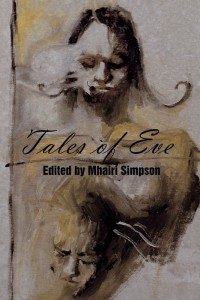 10am Sunday 3rd Tales of Eve launch — Fox Spirit are having a little launch of their collection of the same name, in which is my story "Fragile Creations". And yes, I say this all the time about my stuff, but this is really one of my best stories, a weird and twisted little tale of arrogance and artifice (3). Come along and grab a copy.
10am Sunday 3rd Tales of Eve launch — Fox Spirit are having a little launch of their collection of the same name, in which is my story "Fragile Creations". And yes, I say this all the time about my stuff, but this is really one of my best stories, a weird and twisted little tale of arrogance and artifice (3). Come along and grab a copy.
And that's me at the con. If you're going, and you want to chat, or a book signed, or if you, weary traveller from a distant land, wish to buy a poor starving author a pint of cider (4), then please wander over.
Aaaaaaaaaaaaand finally, I have recently undertaken the official Weirdest Interview Ever with the delightful Emma Newman, as part of her Tea and Jeopardy webseries. My episode is here and the whole series is well worth a listen — catch such names as Paul Cornell, Frances Hardinge and the aforementioned Mr Abercrombie in conversation, and in peril!
(1) No, I am not GoH, nor was meant to be / am an attendant author, who will do / to pad a panel, sign a book or two… (with apologies to TS Eliot)
(2) A title of particular poignancy for any overseas visitors who have to untangle the Gordian knot that is any UK public transport heading anywhere near Brighton.
(3) Arrogance and Artifice: not one of Jane Austen's better works.
(4) If you're really ahead of the game, it's Magners or Bulmers of pretty much any variety, for me. No ice, ideally, but beggars, choosers, you know.
Share this
October 6, 2013
Going to Pieces
Another long hiatus. I am, I kid you not, on the last chapter of the first draft of The Tiger and the Wolf, the first of me new series. This has taken about 10 months to put together, a lot longer than my usual six, partly because it's the first in this setting, hence there's a lot of build and patch work that's gone on throughout, and partly because I've had a whole bucket of other things to do, including working on the MS of Guns of the Dawn (currently slated for a final round of changes before submission), various short stories, and my novel/novella-length serial (1) Spiderlight for Aethernet which I'm just on the last sections of (and it is something I'm very happy with — and that's against the high standard of fiction in the magazine overall).
I am currently working on a big blog post, but it's tricky going, and may be somewhat contentious, so it's not ready as yet. However I might as well gather up a few guest posts I've done and link them here. They actually give a good "state of the art" as to where I am with things, and especially with Shadows of the Apt.
How the series came to be, from the first throes of the RPG it was born out of, all the way to publication. This includes my agent's secret technique for selling a book mostly about insects, to people who rather feel that insects are not the most appealing things in the world. I wrote this for upcoming4.me.
Tor interviewed me before War Master's Gate came out (way back in the days of my youth, all that time ago in August). The topics are, to paraphrase, 1) Jesus, nine books?! 2) Damn, you kill as many people as George RR Martin 3) Seriously, do you like any of your characters? 4) We're surprised you have anybody left for your 10th book, and 5) Yuk, insects! So, you know, pretty standard author interview.
This is me on world-building for Fantasy Book Critic, in a piece that turned out to be surprisingly ranty for a man talking about things that are entirely imaginary. But the imaginary has always been a big part of my life, just this side of attracting the attention of clinicians, so what the hell. As an added bonus, FBC decided to eschew the Very Serious Author photographs that I actually use for publicity shots, and have instead gone for one of me Larping in a floppy hat. Possibly to set off the rantiness.
And lastly, this is my big "what next" piece for Tor, in which I discuss projects both real and highly speculative, even for speculative fiction. I give a little window onto Guns of the Dawn and The Tiger and the Wolf and also talk SF and, er, comedy, apparently. Because one of my great writing strengths has always been my sense of humour.
(1) Apparently 70-80k is a novel. In which case I think Epic Fantasy as a genre needs to go to some sort of counselling.
Share this



